-
Keep Tokoroa Toi Ohomai OPENNo matter where we live in Aotearoa our communities need access to essential services, education and opportunities to grow and thrive. That includes Tokoroa and other small regional communities throughout the South Waikato. But as a result of this Government’s decisions Tokoroa’s Toi Ohomai campus is facing closure. The Toi Ohomai Institute of Technology has published a proposal to cut over 160 jobs which would lead to the purpose built campus in Tokoroa being closed. Toi Ohomai has said the proposal was in response to a Government expectation to become “financially viable”. Tokoroa has already faced the devastating blow of Kinleith Mill shutting down one of its plants with 150 people losing their jobs. Families have had to reevaluate their lives in the South Waikato, with many deciding to move out of the district for more job opportunities. Some have decided to stay, looking into retraining at Toi Ohomai or seeking employment in other areas in the district. The Toi Ohomai campus in Tokoroa is a beacon of light for those who otherwise wouldn't have the means to travel to continue tertiary education in Rotorua, Tauranga or Hamilton. The campus and its courses are an asset to all ages, from young high school graduates to adult learners looking to upskill or retrain. With new housing developments and the Maraetai Road Business Park build, there is a light at the end of the economic recovery tunnel for Tokoroa and the wider South Waikato. If Toi Ohomai remains open in Tokoroa, it has the potential to become a significant economic catalyst for local businesses and the recruitment and retention of young people in the district. If we lose Toi Ohomai in Tokoroa, opportunities for locals will once again become extremely limited and the wider community will be left with the burden to fill the gaps. To creatively and collaboratively invest in our local community and allow time for possibilities to flourish is to contribute to the growth and vibrancy of the South Waikato and provide hope to future generations. "Patience is bitter, but its fruit is sweet". Sign this petition to signal to Toi Ohomai and the government that the Tokoroa community deserves better and will not stand by as our opportunities for youth and future generations are shortsightedly taken away. Let’s show Toi Ohomai leadership that the Tokoroa campus is a valued asset in the community and it must stay open.246 of 300 SignaturesCreated by Elvisa Van Der Leden
-
Fair fares for studentsAs student associations, we’ve had countless students share their struggles with us. A common story is that they’re having to choose between paying for transport to their place of study or covering essential costs like rent or food. That is simply not good enough. Every student deserves to access education without the burden of wondering how they’ll afford to get there. With rising tuition fees and living costs, transport should not be another barrier to success. This change would ease a major financial pressure and help ensure students can stay in school and thrive. The Bigger Picture: We imagine a city where education is genuinely accessible, where no student misses class because they can’t afford the bus or train. Right now, this vision feels out of reach for many tertiary students in Auckland. Students are being squeezed by the rising cost of living: higher rents, more expensive groceries, and growing tuition fees. When you add full-priced public transport on top, it becomes unsustainable. Tertiary students within Auckland receive the lowest discount out of all the groups that have discounts. Group Current Discount Children (Aged 5–15) | 40% off Secondary School Students | 40% off Tertiary Students | 20% off Community Services Card Holders | 50% off Senior Citizens | Free Providing a 50% fare concession for tertiary students is a step toward fairness. It’s an investment in Auckland’s future, in its young people, and in educational equity. Let’s remove the barriers, not raise them.4,786 of 5,000 SignaturesCreated by AUT Students Association
-
Justice and Dignity for Abandoned Newborns in AotearoaBecause no baby should be discarded and forgotten. Because every pēpi deserves to be honoured. Because silence is not respect — it’s erasure. When a baby like Anahera (Onehunga, 2021) or the Freeman’s Bay newborn (2024) is found alone and abandoned, they deserve more than just a coroner’s report. They deserve love, karakia, and the dignity of being remembered. These cases are extremely distressing and complex, as such they require nuanced approaches. This isn’t just about grief — it’s about how we treat the most vulnerable in our country. It’s about our values as a community, as tangata whenua, as whānau. As a mother, compassion and empathy must be intertwined with care. The more supportive pathways we can extend to the people who are suffering, the greater a chance we have of protecting the safety and wellbeing of children. was found. This petition is my karanga — a call for dignity, justice, and aroha.15 of 100 SignaturesCreated by Julzz Kearns

-
Petition: Urgent Safety Improvements for Morgan St–Cornfoot St–Short St IntersectionNZTA data confirms this is a high-risk intersection, with the greatest number of crashes occurring on Cornfoot Street heading from town toward Castlecliff. However, crashes have occurred in both directions, as well as on Morgan Street. Excessive speeds and poor road design continue to pose a serious hazard.235 of 300 SignaturesCreated by Jamie Ryan
-
PM Luxon: Uphold Codes of Conduct - Call David Seymour into lineResponsible leaders welcome advice from experts when they are creating laws and policies. They know good decision making means planning for the long term, considering diverse points of view and making evidence based decisions. This is also key to a healthy democracy. Which is why Deputy Prime Minister David Seymour’s targeting and harassment of people in academics and officials is so concerning. The Prime Minister has the responsibility to ensure the conduct of Ministers of the Cabinet is fitting of their office and inline with the Cabinet Manual. The Deputy Prime Minister’s deliberate targeting of academics and the exposure of Christchurch Council staff to ridicule by comparing them to Russian President Vladimir Putin, following their opinions on the Regulatory Standards Bill, appears to be a direct breach of the Cabinet Manual’s standards of conduct. It’s a blatant attempt to stifle academic freedom and any dissenting opinion. For the Deputy Prime Minister David Seymour to lead this online harassment campaign is concerning, as such actions could incite behaviour that spills into real-world violence. This is irresponsible and a clear breach of public trust. We expect our leaders to keep us safe, not throw us into harm’s way. Such behaviour by the Deputy Prime Minister compromises the safety and wellbeing of the targeted individuals and sets a dangerous precedent for how dissenting voices in our society are treated. It also breaches sections 2.53 and 2.56 of the Cabinet Manual. As Prime Minister and Head of the Cabinet, we urge you to immediately investigate this matter and address this serious breach of the Cabinet Manual. We expect our officials to display the highest standards of conduct and ensure that all members of our community can contribute to public debate without fear of harassment or intimidation. An official letter to this effect has already been sent to Luxon - sign this petition if you want to add your power behind the call!30,221 of 35,000 Signatures
-
Make NZ Schools HP Free!As teachers, the wellbeing of tamariki and rangatahi is always at the forefront of our minds. We want children everywhere to be able to thrive and learn, and to grow up in a safe, stable environment. Unfortunately, our NZ schools are reliant on a leasing scheme which includes a contract between the Ministry of Education and HP - a company that provides computer hardware to the genocidal regime in Israel. HP products assist Israel in maintaining the illegal occupation of Palestine [1]. The contract between HP and the NZ Government is worth millions of dollars. HP currently supplies many teachers and education staff in schools across Aotearoa New Zealand with leased HP branded laptops, tablets and Chromebooks. This means that as educators in Aotearoa, we are using technology which supports a company that contributes to the ongoing occupation and genocide in Palestine when we do our mahi. This does not align with the values of compassion, equity, and care for future generations that we hold as teachers. Background HP Inc (US) provides services to the offices of genocide leaders, Israeli PM Netanyahu and Financial Minister Smotrich [2]. HPE, which shares the same brand, provides technology for Israel’s Population and Immigration Authority, a pillar of its apartheid regime [1]. This ID system forms a core part of the Israeli apartheid regime’s tiered system of citizenship and residency that privileges Israel’s Jewish population and gives inferior status and rights to Palestinians, especially those in East Jerusalem. HP's technology is used to uphold institutional racial discrimination and segregation in relation to freedom of movement, housing, employment, marriage, healthcare, education, and policing. This discrimination is further exacerbated in the case of Palestinian “residents” in occupied East Jerusalem, whose most basic rights can and are being revoked arbitrarily. The system also holds information about Israeli citizens living in illegal settlements in the occupied West Bank, therefore serving Israel’s settler colonial project directly [3]. HP has also worked directly with the Israeli military, helping build its IT infrastructure [4]. This has included a program with the Israeli Navy which enforces the illegal naval blockade on Gaza [1]. Teachers for Palestine Aotearoa stands with activist groups across Aotearoa who want to see our nation live up to a long history of fighting against oppression. We demand justice for Palestine! We call on Erica Stanford and the NZ Government to have courage, listen to what New Zealanders want, and cease all procurement agreements with HP. References: [1] https://www.whoprofits.org/companies/company/3774?hewlett-packard-enterprise-hpe [2] https://bdsmovement.net/BoycottHP-GazaGenocide-Update [3] https://visualizingpalestine.org/visual/israeli-id-system-animation/ [4] https://investigate.afsc.org/company/hewlett-packard265 of 300 SignaturesCreated by Teachers for Palestine Aotearoa
-
Restore The Southerner TrainA restored Southerner train route offers affordable transport for 750,000 SI residents, bridging gaps where air is too costly for students/low-income, coaches inaccessible for disabled/elderly, and car travel unsafe/expensive. This boosts regional economic development and tourism. Recent rail investments, like Hillside Workshops, new ferries, and Inland Ports, confirm rail's viability in the South Island.6,412 of 7,000 SignaturesCreated by Patrick Rooney

-
Keep Aotearoa Incinerator Free!Why we want Aotearoa to stay incinerator-free Incinerators are a serious health hazard Incinerators release highly toxic dioxins, heavy metals, and PFAS, among other pollutants. These are some of the most toxic substances known to science, and can cause things like cancer, damage to the nervous system and organs, birth defects and infertility! Would you want to be breathing, drinking and eating this stuff? Incinerators still need landfills Incinerators do not stop the need for landfills. The ash, which can be as much as a third of the total amount of rubbish that went in, has to be landfilled and handled as hazardous waste. Along with that, some stuff simply can't be burnt ever because of its toxicity, or because the material simply isn’t burnable. Incinerators are an economic loser The hype around incinerators suggests they will provide lots of jobs and economic benefits to the communities they are built in. But, for every job an incinerator provides, activities that actually stop the waste before it’s created - like recycling, composting, reuse and repair - provide hundreds more jobs and local economic activity. Incinerators pollute air, land and water Even the most sophisticated modern incinerators release harmful substances out of their chimneys and into the ash and wastewater, leaving a toxic legacy for those spaces and ecosystems for generations to come. The toxic ash has to go somewhere - mostly to a specialised landfill, where the pollutants can leach out. Incinerators are a disaster for the climate In 2024 the BBC found that incineration is just as bad for the climate as coal power, and five times more polluting than the average unit of UK energy. New Zealand reports have also found that incinerators will spew out far more carbon than landfills, especially as more organic waste gets composted instead of landfilled to meet New Zealand’s methane reduction targets. Incinerators keep the waste train going Incinerators need 20 to 30 years of burning as much rubbish as they possibly can to justify the hundreds of millions of dollars needed to build and run them. Imagine if all that money was invested in smart zero waste projects instead? What a waste! Would you want a dirty incinerator in your community? For a future where the earth's resources are valued, where people have opportunities to do meaningful zero waste work, and where we know our air, water, soils and food is safe… Let's Keep Aotearoa Incinerator Free! FAQ Should we follow Europe’s example? Europe’s incinerators are not what they’re cracked up to be, and are fast becoming yesterday’s technology. These days Europe is retreating from burning rubbish because it is harming their climate and waste reduction, reuse and recycling goals. For example, Denmark has invested heavily in incinerators but now generates more waste per capita than any other country in Europe. They recently announced a plan to close down 30% of the country's incinerators in order to get their greenhouse gas emissions and waste generation under control. Wales and Scotland have also banned any new incinerators being built, and England is considering it too. And the EU no longer considers incinerators eligible for climate-friendly investment. What about technologies with fancy names like pyrolysis and gasification? Despite all the hype, these technologies have a horrendous track record of failure across Europe and elsewhere. They might be OK for clean, organic materials like forestry slash, but add anything else and they create toxins as bad or worse than incinerators. Aren’t incinerators generating much needed power? While companies like to sell these technologies as ‘waste to energy’, they not only produce dirty, non-renewable energy, but they are extremely inefficient. A study from 2023 found that European incinerators are only able to capture a small proportion of the energy they burn - roughly 25% at best, compared to around 35% for coal power, and 55% for natural gas. Zero waste - is it really achievable? Absolutely! Zero waste is not just about the literal goal of achieving ‘zero’; it's as much a practical toolkit and guidebook to drastically reducing waste across our communities starting with preventing the creation of waste in the first place. It is well-established, with an extensive evidence-base and a huge range of real life options already being implemented in communities all over the world right now. Check out the mahi of groups like Para Kore, Zero Waste Aotearoa, Zero Waste Europe, and GAIA for some inspiration!544 of 600 SignaturesCreated by Zero Waste Aotearoa
-
50 Years is Long Enough – Modernise NZ’s Drug Laws🕰️ In 2025, the Misuse of Drugs Act (MODA) turns 50, half a century since it was written for a very different time. It’s been amended in patches but never properly reformed, leaving us with a system that is: ➡️ Outdated and fragmented ➡️ Inconsistent with modern science ➡️ Costly to enforce ➡️ Disproportionately harming Māori, Pasifika, and young people 📚 Between 2007 and 2010, the Law Commission undertook a thorough, evidence-based review. In 2011, it recommended replacing MODA with a new, health-focused framework. That advice still hasn’t been acted on. ⚠️ Since then, everything has changed: ➡️ Synthetic cannabinoids, vaping, and novel psychoactives have emerged ➡️ The Psychoactive Substances Act 2013 created a parallel regime ➡️ Drug checking was legalised in 2021 ➡️ Medicinal cannabis access has expanded ➡️ Other countries, like Canada, Portugal, and Australia, have updated their laws based on evidence 🔎 Aotearoa has changed too, in how we understand harm reduction, public health, equity, and our responsibilities under Te Tiriti o Waitangi. This petition is not about legalisation or decriminalisation. It’s about bringing our drug laws into the 21st century, grounded in evidence, focused on health, and responsive to the needs of all New Zealanders. 🔍 What this petition is not about 🚫 Legalising or decriminalising any drug 🚫 Repeating the 2011 review 🚫 Proposing a specific policy outcome ✅ This is a neutral, inclusive call for an expert-led, modern, cross-party review, not ideology, but good governance. 🧠 What the review should consider ➡️ Whether current laws reduce harm and promote public safety ➡️ If the framework is clear, proportionate, and equitable ➡️ The cost and effectiveness of enforcement ➡️ Alignment with health and Te Tiriti principles ➡️ International best practices and a consistent, risk-based approach ✊ Why now? 🧓 MODA is half a century old ⚖️ Inequities and harm persist 💸 Enforcement costs are high; outcomes remain poor 🧠 The 2011 review provides a strong foundation, ready to build on 📈 Harm reduction and public health momentum is growing 🗳️ It’s time for a unified, evidence-based system that works for all New Zealanders ✅ Join the call We’re calling for a modern, fair, and expert-led review of Aotearoa’s drug laws, one that reflects our shared values, honours Te Tiriti o Waitangi, and responds to today’s challenges. 📢 This is your chance to support a process that is: ✅ Neutral ✅ Cross-party ✅ Grounded in evidence ✅ Respectful of Te Tiriti o Waitangi ✅ Designed to reduce harm and promote fairness 🖊 Sign now to help modernise New Zealand’s drug laws. 📨 Share this with your whānau, community, MP, and allies. Together, we can ensure the next 50 years are smarter, fairer, and more effective.1,031 of 2,000 SignaturesCreated by Modernise Our Drugs Act

-
Support the Unlawful Occupation of Palestine Sanctions BillWhy the Bill Matters The Bill proposes targeted sanctions against individuals and entities complicit in maintaining Israel’s unlawful presence in the OPT. These sanctions would restrict the movement of assets, services, and individuals between New Zealand and those contributing to violations of international law. The Bill builds on New Zealand’s existing sanctions framework—used in response to Russia’sinvasion of Ukraine—and is a credible, principled method for: • Upholding the rights of Palestinians, Israelis, and others affected by the occupation and apartheid policies. • Translating New Zealand’s verbal commitments at the United Nations into tangible legislative action. • Reinforcing the integrity of the rules-based international order and our obligations under international law. Call to Action This is a member’s bill. Under Standing Order 288, it may be introduced directly if 61 or more non-executive MPs express their support. Given the escalating humanitarian crisis in Gaza, we believe the urgency of this situation justifies bypassing the standard ballot process. We respectfully ask you to: 1. Publicly support the introduction of this Bill, allowing Parliament to consider this critical issue in a timely and principled manner. 2. Advocate within your caucus for party support, and encourage fellow members to join the 55 MPs who already support the Bill, so we may reach the 61-MP threshold. 3. Commit to voting in favour at all stages of the Bill’s progression, demonstrating that New Zealand will not tolerate violations of international law. A Matter of Conscience Standing up for the fundamental rights of Palestinians—including children, families, and the elderly—is a moral imperative. History will remember those who chose to act in the face of injustice. We, the undersigned, urge you to stand with us and support this Bill. It is a vital opportunity for New Zealand to show leadership, uphold international law, and affirm the values we claim to represent on the world stage. Ngā mihi nui, Your constituents652 of 800 SignaturesCreated by Katrin Millener
-
Give Them Green – Gore Aviary Welfare CampaignThese birds have no voice, no freedom, and no choice in their living conditions — but we do. I care because I believe all animals deserve dignity, stimulation, and the ability to behave naturally, especially when they’re under our care. It’s not just sad, it’s against New Zealand’s own animal welfare codes. If we don’t act, who will? This campaign is about doing the right thing, creating a small but meaningful change that reflects our values as a compassionate community. Let’s make Gore’s aviary something we can all be proud of.35 of 100 SignaturesCreated by Conrad Broad
-
Oneone ki te WhenuaOn the 5th of May 2025, Ngati Oneone activated 'Oneone ki te whenua' 185 years to the day that our tipuna Rawiri Te Eke Tu signed 'ae ra' on Te Tiriti o Waitangi. 80 years later, the whenua of his hapu was taken piece by piece in the name of public works and harbour development. Within 10 years Ngati Oneone was displaced and homeless, a people without whenua. Today the Gisborne District Council, Trust Tairawhiti and Port Eastland are the owners of what remains of that whenua. Port Eastland has offered a small piece back with conditions. Those conditions continue to oppress our right as a hapu to exercise our Tino Rangatiratanga, offering land and in return silencing our voice regarding future port development, RMA applications and the risk of being fined if we were to ever oppose them. 100 years removed from our whenua, enough is enough! Ngati Oneone Hapu has lived, bred and died on our tribal lands from Pouawa in the North of Gisborne to Te Toka a Taiau, Turanganui awa, including the lands known as Kaiti/Kai Iti/Puhi Kai Iti. In 1852 our first Pa (on Hirini St) was built. In 1885 the Harbour Board was enabled to carry out major works under the Harbour Board Act, in the area: • The blowing up of Te Toka a Taiau • The blowing up of Puakaiwai/Punaariki/Tuaiti Is • The removal of Te Poho o Rawiri Pa and tribal housing Under the Public Works Act, significant lands were taken, here to name a few: • Titirangi Maunga (parcels of land sold to pakeha individuals and corporations) • Rakau a Ue Urupa (roadway created, urupa desecrated) • Turanganui awa - Rua Koura (continued degradation) • Ruatanuika maara/gardens (destroyed) • Te Umu a Tawhiwhi (destroyed) • Te Waiu o Hamoterangi (destroyed) • Te Pioi Pa (destroyed) • Puhi Kai Iti - reefs (destroyed) • Roadway put through Rakau a Ue Urupa The raupatu of our lands has alienated Ngati Oneone occupation and cultivation in these areas, destroyed puna wai, wahi tapu and urupa. Atrocities on Ngati Oneone hapu, whenua and wai are actions that have been applied and imposed on our hapu for the past 100 years. In all those years, Ngati Oneone have not been treated in Fairness, Dignity or Human Rights. This cannot be the responsibility of the fourth generation to seek redress!6,488 of 7,000 SignaturesCreated by Te Owaina Gibson

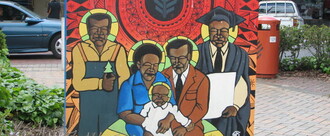

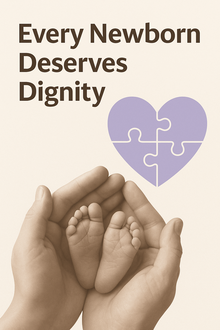
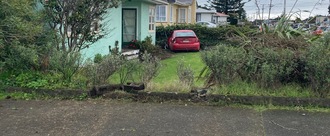
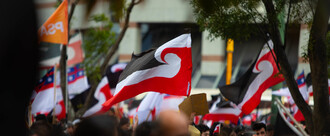



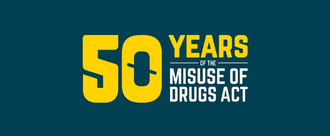
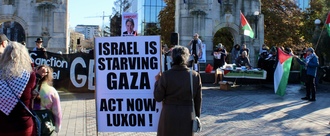
.jpg)
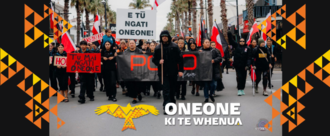.png)